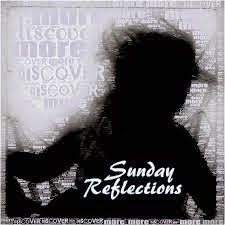Sunday Reflections: Faith Shaming and Mental Illness, Reflecting on Faith and Mental Illness for the #MHYALit Project
Please note, I am writing this post today from a Protestant point of view, because that is my faith and the faith I am most familiar with, but I believe it is true of all faiths. So while the words may not be correct, the idea is universal. You can read all the posts as part of the Mental Health in YA Lit Discussion here.
 My first real experience with mental illness – fully understanding that someone I knew and loved was struggling with mental illness – happened in my late 20s. My best friend, a devout Christian, struggled with depression. She had fallen into a deep, depressive state that was affecting her work, her life, and her image of herself. You could call her on the phone to ask her how she was and tell her that you loved her and she would tell you how alone in this world she was. I didn’t understand it at the time, but with my own personal recent struggles with depression I do.
My first real experience with mental illness – fully understanding that someone I knew and loved was struggling with mental illness – happened in my late 20s. My best friend, a devout Christian, struggled with depression. She had fallen into a deep, depressive state that was affecting her work, her life, and her image of herself. You could call her on the phone to ask her how she was and tell her that you loved her and she would tell you how alone in this world she was. I didn’t understand it at the time, but with my own personal recent struggles with depression I do.
ADVERTISEMENT
ADVERTISEMENT
Her burden was amplified by the fact that she felt – and was being told – that if she would just “trust God” and “give it all to God”, she would have no reason to worry, or fear, or despair. So for her, her deep descent into depression must have somehow meant that she was not a good Christian. She was shamed by those around her who suggested that her mental illness must somehow be an indicator that she was not in a right relationship with God.
She eventually broke off our and seemingly all relationships. She disappeared into a darkness that was vast and real. To this day I have not heard from her.
But in those months before she left, I heard her struggle often with her faith and what it meant that she had this depression struggle. She blamed herself for not having a strong enough faith, believing that if she just believed hard enough or strong enough, that she would not be depressed. She blamed herself and that blame made everything so much worse for her.
****
“God has not given you a spirit of fear . . . ”
God will not give you more than you can handle.
Pray without ceasing. Give it over to God.
The peace that passes all understanding . . .
When you live in a faith community, it can be hard to reconcile the doctrines of faith with the reality of mental illness. We are often told that we should choose joy, count our blessings, have a deeper faith, and grow closer to our god to be at peace. In the Christian faith, it is preached that God is in control of your life and if you trust God and have a righteous faith, then you should be at peace. Faith is supposed to give you the peace that passes all understanding.
In contrast, mental illness does not leave one with a sense of peace. Depression. Anxiety. Panic attacks. Social anxiety. Obsessive compulsive disorder. Schizophrenia. These are the opposite of peace. These various illnesses can leave one feeling lost, alone, frightened, and emotionally disorganized.
At times, completing daily tasks can become incredibly difficult. Sometimes, getting out of bed can be the greatest accomplishment. There is physical and emotional pain that goes along with mental illness.
They effect mood, thought processes, and ones sense of self.
There are many misconceptions about mental illness that exist in our world.
The onus for our mental illness is often put on those who are suffering: because we are not doing x, y or z correctly, it is believed, we have this mental illness. And if we just do x, y or z, our mental illness will go away. The x, y, and z can be anything. Eating incorrectly. Having wrong attitudes. Not trying hard enough. Not believing deeply enough.
But this is a based on a fallacy.
Mental illness is not a faith issue. It is not a belief issue.
It is an illness. One that rests in the mind and body and affects the mind and body.
****
Some of my most depressive episodes have been the times of my greatest and most profound faith.
During the loss of my pregnancy, for example, I was in a deep, depressive state. I recall one day laying on my bedroom floor and wailing in grief. I did not know how I would live and survive this, or if I even wanted to. And as I laid on that floor, angry at my God and the world, I had a comforting vision of God kneeling beside me and catching my tears into his cupped hands so that they did not reach the floor. In this moment I felt somehow that the message was, “you are not alone and I grieve with you and for you.” I have never felt more close to my God than in that moment.
This moment comforted me, and reminded me of my faith, but it did not somehow magically cure me of my grief and depression. It carried me through, but it did not cure.
****
Can faith cure someone of mental illness? As a person of faith, I have to believe that the answer is sometimes yes. But I also see all around me that for reasons that I can’t begin to understand and I don’t have the time to contemplate, the answer is so very often no. The reality is, 1 in 4 people will struggle with mental illness. Most often, mental illness presents in the teenage years. Some experience it for a lifetime, others for just a period of their life.
It would be arrogant of me to presume to know the cause or cure of each person’s mental illness. It’s dangerous and shaming for me to suggest it is because they have the wrong faith or are practicing their proclaimed faith in wrong or insufficient ways. And if you have ever struggled with mental illness, you know that shame is one of the worst things we can inflict upon those with mental illness. It is the least helpful response. People struggling with mental illness don’t need outside shame, they are wrestling with their own shame, just one of the many intense feelings they are trying to navigate at a time where they feel lost and alone.
The causes of mental illness can vary. For some, it is brain chemistry. For others, it is a symptom of another underlying health issue or illness. For some, it is situational. Sometimes it lasts a lifetime, sometimes it last for a period of time. And the answers can vary depending on the cause. In instances with situational depression or anxiety, finding and fixing the situation can help resolve the issue. In other instances, therapy and medication are needed.
Prayer doesn’t hurt. If you believe in prayer, it never hurts. Neither does meditating or going to church or reading your holy book or surrounding yourself with a supportive faith community. If you have a faith system, it makes sense to draw on that faith system in difficult times to sustain you. But the caveat is that the faith system must support you. This means it must be free of judgment and shame and full of love, acceptance and support. They have to be willing to support you at your worst, when your life is messy and difficult, as well as when you are at your best and easy to love.
Shame, judgment, condemnation . . . those are not helpful responses. They compound the problems. They alienate. If a person feels shamed by their faith community, they may pull away from the very community they value and need in times of crisis. Or permanently. If you repeatedly hear that you are doing some wrong or don’t have a strong enough faith, you can reach the point of despair and rejection where you stop showing up. If we tell people enough that they are doing it wrong, they stop trying.
If you or someone you love suffers from mental illness, it is not because you or they are not strong enough in faith. It is not because you are being punished for some sin or the sins of your fathers. It’s because you lost the life lottery and are the 1 in 4 that suffers from mental illness. It’s a sucky lottery to “win”, but it’s not your fault.
If you are a person of faith and you know someone who is struggling with mental illness, let me suggest some phrases that you may want to avoid in supporting them.
1. Count Your Blessings
In times of struggle, we often tell our friends to just “count your blessings.” The rationale is, I believe, that by focusing on the positive, you will see your life in a different perspective. The flip side is, this phrasing can be dismissive and invalidating. It’s also presumptive. Depression, for example, is not about a lack of perspective or focusing on the negative. Yes, depressed people may come across as being negative, that’s the disease, but it is not caused by negative thinking and it is not cured by positive thinking. Sometimes we need to just sit with someone in the space that they are in and allow them to feel what they are feeling.
2. Choose Joy/Choose Peace
Nobody chooses depression or anxiety or any other mental illness. And much like counting your blessings, these types of statements also invalidate where a person is at in their journey with mental illness. While it is true that trying to focus on the positive can help, being constantly told to ignore what you are thinking and feeling as if you don’t have a right to those thoughts and feelings is not, in fact, supportive. Sometimes we just want someone to listen without judgment and to acknowledge that what is happening to our mind and body is, in fact, awful and that we are loved irregardless.
3. Get Right with God
It’s presumptuous to assume that a person struggling with a mental illness is not somehow already right with God. It is an error to assume that what is happening to them is because they aren’t praying enough or aren’t believing strong enough. Mental illness is not an expression of faith, or lack of faith, it is an illness.
4. Trust in God
ADVERTISEMENT
ADVERTISEMENT
Although not all faiths treat medical science the same, for the most part when we have an illness we go to the doctor. If you are having a heart attack, you will most likely call 911 and get emergency care. If you have diabetes, you will most likely put yourself under the care of a doctor to help manage your symptoms and take care of your life. If you have cancer, you will most likely go through a variety of treatments to help rid your body of cancer. You may pray and ask those around you to pray, but you will probably still see a doctor as well. Some people seem to be healed of their ailments, but many are not. If you would never tell your loved one with cancer to just pray for healing and not see a doctor, then you shouldn’t tell those with mental illness to pray for healing and suggest that their lack of healing is somehow their fault.
5. Don’t Let the Devil Tempt You
Throughout human history, mental illness has often been depicted as the possession of a body by demonic spirits. With the advancement of science, we now know that mental illness is about chemistry. Body chemistry. Brain chemistry. Hormones. There are a lot of scientific reasons underlying mental illness. But there is still that stigma in the faith community that suggests that mental illness is somehow a believer’s fault. Maybe you aren’t praying hard enough? Maybe you have sin in your life? Maybe you are being possessed or tempted by a demon? I can’t speak to the idea of demons and angels and possession, there are so many differing theologies on these topics. But I can speak to the truth of mental illness: it is a biological/physiological illness. There are scientific causes and we have a variety of tools at our disposal to help people manage the symptoms. And we are learning more every day.
Mental illness is not the same thing as negative thinking or pessimism. It’s not a choice. It’s not failing to believe deeply enough or try hard enough. It’s not incorrect belief. It’s not a lack of faith. It’s not turning away from God, whoever your God may be.
And it’s not your fault.
There is no shame in mental illness.
As members of faith communities we must stop shaming those among us who struggle with mental illness. And we must especially stop using our faith to shame them. Do unto others . . .
About Karen Jensen, MLS
Karen Jensen has been a Teen Services Librarian for almost 30 years. She created TLT in 2011 and is the co-editor of The Whole Library Handbook: Teen Services with Heather Booth (ALA Editions, 2014).
ADVERTISEMENT
ADVERTISEMENT
SLJ Blog Network
Name That LEGO Book Cover! (#53)
Cover Reveal and Q&A: The One and Only Googoosh with Azadeh Westergaard
Exclusive: Vol. 2 of The Weirn Books Is Coming in October | News
Fighting Public School Book Bans with the Civil Rights Act
ADVERTISEMENT








I appreciate your compassionate article as a person who has struggled with depression and who also struggled with religious faith at one point in my life. I just want to share my experience that my (Catholic) family used to treat my depression with The Sacrament of Confession, or talking to a priest about my sins, and that was NOT the right treatment. It failed horribly and in most cases increased my symptoms and my anxiety. It wasn’t until I was an adult, free from my parents and my church, that I was able to get REAL treatment and medication from professional mental health providers and doctors. Priests and pastors are not trained on mental health and it’s a shame in my opinion that so many people of faith choose to consult a professional as a last resort–it should be the first step. You wouldn’t go to a priest if you had problems with dizziness or fainting. You would go to a doctor. Same for mental illness and depression. I’m so glad I am free of my depression now and have a great treatment that has worked for more than five years.
This is such a well-written and important article. Thank you for writing it and for sharing your own struggles so honestly — that can’t have been easy. But the points you make are things that many well-meaning Christians, and sometimes people of other faiths as well, really need to hear. When I think about depression as it’s actually portrayed in the Bible (as opposed to how Christians sometimes use verses from the Bible and try to apply them to depression), I’m struck by how non-judgmental it is. The idea that really spiritual people won’t experience depression is really not found anywhere in the Bible that I can see — in fact quite the opposite, when you look at Elijah being so depressed he wanted to die because of all his enemies, or Paul saying that there were times when he and his fellow apostles were “cast down” and “despaired even of life”. If it can happen to the great heroes of faith there’s no reason to claim it can’t or shouldn’t happen to people of faith today.
This article was a breath of fresh air. As a person of faith who struggles with anxiety and depression, and who struggled with severe post-partum depression, I have been on the receiving end of all of the above comments from people who were trying to encourage me. While I understand that these words were spoken to me in a spirit of love most of the time, they were not helpful. They were never helpful. They made me feel alone and unacceptable; they gave me the sense that my depression was something I needed to swallow away and often heightened my anxiety about seeking the help I needed. So often, the abuses meted out by church members are unintentional–acts of ignorance rather than acts of malice. Nonetheless, such acts can destroy both faith and trust, and they create situations where people live in pain and darkness for much MUCH longer than necessary.
I am not free of my depression and anxiety. I don’t know when I’ll be free of it. On the plus side, I finally have come to understand that it’s not a reflection of who I am or what I believe in–it’s just a side effect of my brain chemistry. A treatable side effect. And thanks to my experience, I can speak empathy to other people who are struggling just like I have, and who are hearing those same idiotic platitudes from the same kinds of people. Sometimes, it’s just nice to know you’re not alone.